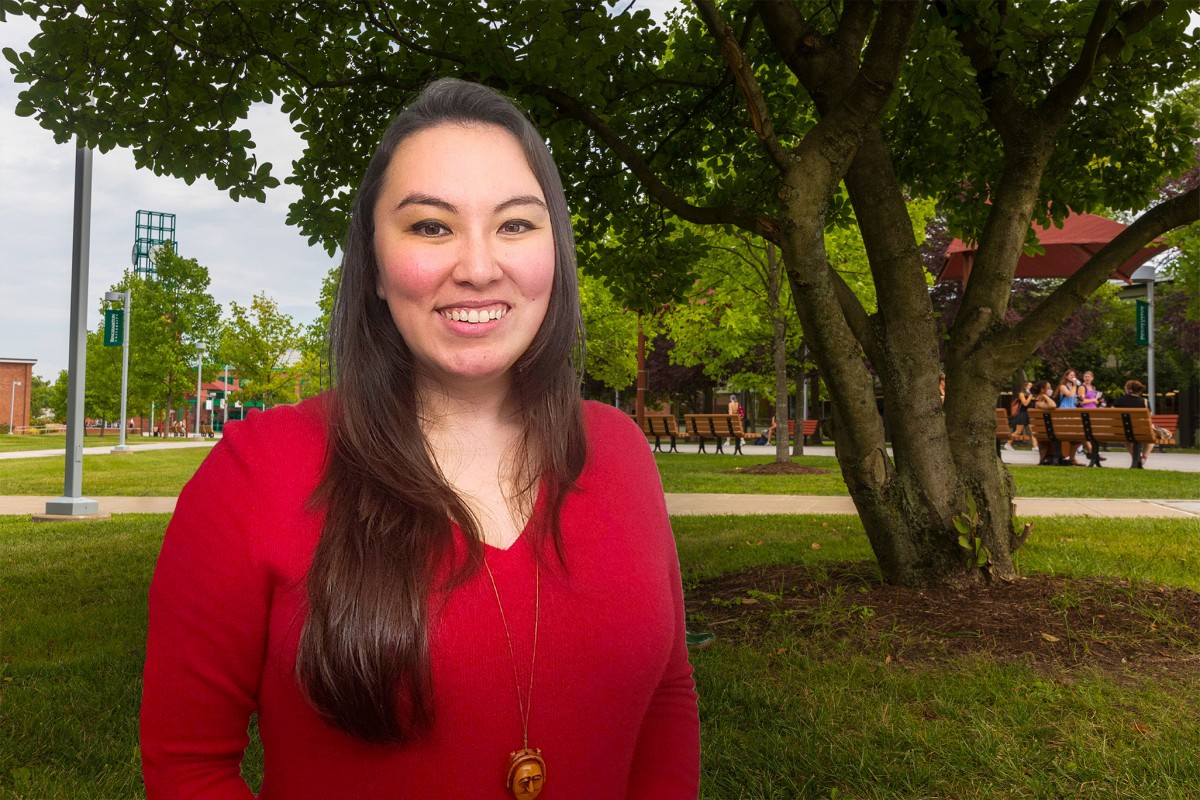Alcohol and PTSD research: Psychology student receives prestigious fellowship

All too often, individuals struggling with post-traumatic stress disorder (PTSD) reach for a bottle to quell the pain of their symptoms. Such a choice not only ends up worsening their mental health, but it can wreak havoc on their relationships.
A fifth-year doctoral student in Binghamton University’s clinical psychology program, Eileen Barden studies this painful intersection of substance abuse, PTSD and relationships. In addition to doing clinical work, she conducts research in Assistant Professor Christina Balderrama-Durbin’s Couple Adjustment to Stress and Trauma (CAST) lab, which examines traumas and stressors that affect different populations, including the military.
“Coming from a military family, I am particularly interested in working with the veteran population,” Barden said.
Recently, she received a prestigious two-year fellowship from the Enhancing Diversity in Alcohol Research (EDAR) training program, funded by the National Institute on Alcohol Abuse and Alcoholism. The fellowship provides support in applying to pre-doctoral internships; participants also gain hands-on research experience while working with data and completing a project with the guidance of their EDAR mentor.
EDAR serves a diverse cohort of graduate students from across the United States. Diversity is a strength when it comes to research, both in terms of researchers and study participants, Barden pointed out.
“By being more inclusive, we are better able as a field to gain a greater understanding of how alcohol may influence different aspects of peoples’ lives, which can help inform evidence-based treatments. Bringing in more diversity can also help improve how we measure different research constructs and are able to ask the right research question generally,” she explained.
Born in Japan, Barden came to the United States at the age of 5 and grew up in the Baltimore area, where she later earned her bachelor’s in psychology at the University of Maryland – Baltimore County (UMBC). Prior to her doctoral program, she worked as a lab manager examining emotion regulation processes in relation to PTSD and depression at the University of North Carolina - Greensboro, and also as a research analyst at the Medical University of South Carolina examining the treatment of PTSD and substance use.
She came to Binghamton specifically to work with Balderrama-Durbin and has learned a great deal from her mentor, from forming research questions and designing studies to the ins and outs of academic publishing. In addition to Balderrama-Durbin, she also found inspiration in Psychological Clinic Director Thomas Harding for his commitment to training students to excel in the field, she said.
Barden’s initial interests centered on how individuals can survive and thrive after experiencing trauma and chronic stressors. During her research and clinical practice, she learned more about the pervasive nature of substance abuse that often coincides with PTSD, particularly alcohol, and how romantic relationships can influence outcomes.
“Throughout my training, it became clear to me that to gain a better understanding of the trajectories of PTSD, it is important utilize a comprehensive perspective,” she explained. “I usually approach research and clinical practice from the biopsychosocial model.”
After earning her doctorate, Barden plans to continue clinical work serving veterans, and conducting PTSD and alcohol use research within a Veterans Administration medical center.
“Eileen has built an impressive record of scholarship and is so deserving of this type of recognition. She has an outstanding dedication to improving the mental health of historically marginalized and high-risk populations exposed to trauma,” said Balderrama-Durbin. “No doubt with Eileen’s determination and aptitude, she will continue to emerge as a leader in the field of post-traumatic stress and alcohol use.”

